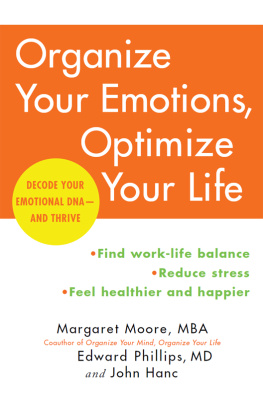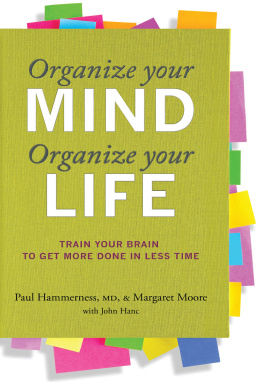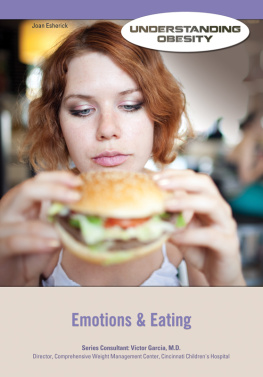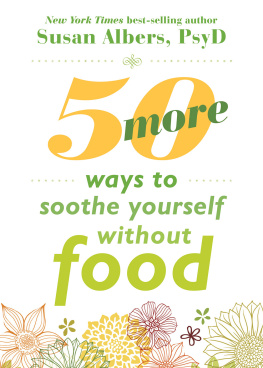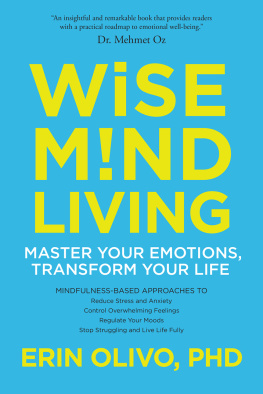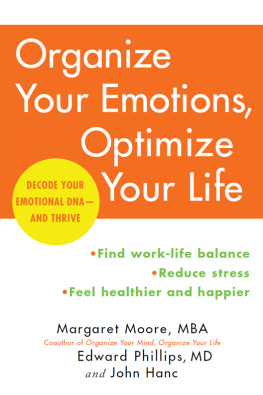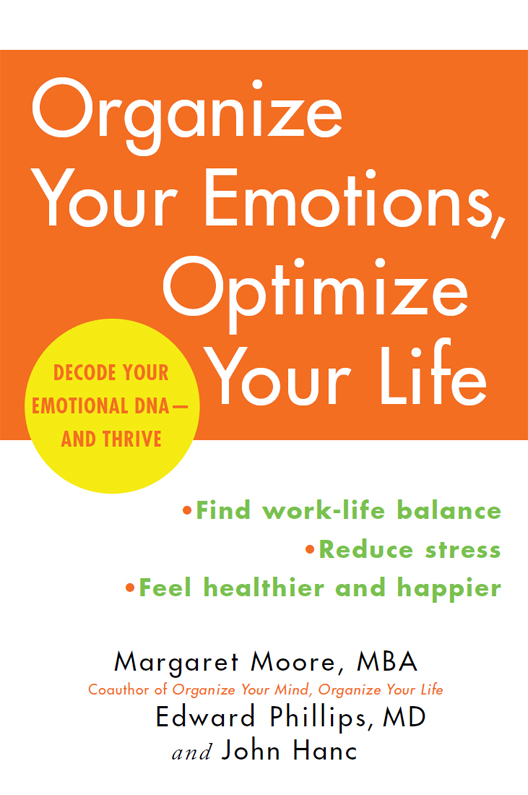CONTENTS
Guide
Ask yourself this question: Just how stressed out are you?
A. Not at all. Im cool, calm, and collected. I feel that Im in tune with myself and my needs. I know where Im going, and Im on my way. No sweat!
B. I think I have a handle on everything, but there are days when my blood pressure soars, my mood is foul, and Im ready to scream at the first person who cuts me off on the way to work!
C. I feel like Im in a constant state of frenzy. Im totally stressed out... at home, on the job, even on vacation! Im anxious, Im nervous, and Im agitated.... Oh, did I say Im stressed out? Help!
If you answered A, B, or C, this book is for you! Well explain why in a minute, but first, here are a couple more questionsand a clarification.
Stress is a term thats thrown around a lot. Sometimes there are good reasons to be stressed. You could be stressed because youve just been through a divorce, you lost your job, or you suffered through some other personal or professional crisis. Thats to be expected. Sometimes, though, the feeling of being stressed is a manifestation of deeper issues. Perhaps you feel that way because, like so many of us, you dont get the sense that your life is headed in the right direction or that youre living up to your capabilities.
Lets find out your current state of mind with our next question: How much of the time over the past thirty days have you felt this way?
1. Cheerful
2. In good spirits
3. Extremely happy
4. Calm and peaceful
5. Satisfied
6. Full of life
You can answer:
A. All the time
B. Some of the time
C. Hardly ever
How many As did you get? None? Did you get mostly Bs and Cs? You will definitely want to read on. Heres our last question (actually, there are two). This pair of questions zeroes in on the heart of the matter.
Do you feel like youre firing on all cylinders in your life? Do you feel as if youre engaged and challenged, but calm and generally satisfied?
A. Yes, my life is sailing along smoothly, thank you.
B. Theres a lot of turbulence, but Im still airborne.
C. Im grounded. I think my cylinders are clogged.
Okay, thats the end of our questions (for now). If you had a lot of Bs and Cs in your answers, youre like the majority of Americans. You are, to use psychological terms, more likely to be surviving or languishing, not thriving.
This book can change all that. This book can help you reduce stress and tame the frenzy, yes. But more importantly, this bookand the groundbreaking theory behind itcan help you flourish, thrive, and soar.
And the way we point you skyward is by first looking inward.
THRIVING INSTEAD OF LANGUISHING OR SURVIVING
How do we define emotional well-being? In his influential 2002 paper The Mental Health Continuum: From Languishing to Flourishing in Life, social scientist Corey L. M. Keyes of Emory University examines various definitions of mental health and determines that individuals who seem to be functioning best have warm and trusting relationships, have a direction in life, are able to shape their environment to satisfy their needs, and have a degree of self-determination.
These individuals also appear to like most parts of themselves. (Yes, thats parts, plural. This is an important point, and well come back to it.) In addition, those who are flourishing feel that they are contributing to and are engaged with society, and they have the ability and the willingness to adapt to change.
To be flourishing, Keyes writes, is to be filled with positive emotions and to be functioning well, psychologically and socially. On the other hand, those who are languishing, Keyes posits, have feelings of emptiness and stagnation, constituting a life of quiet despair. These individuals describe themselves and their lives as hollow... empty... a shell... a void.
Since the dawning of the twenty-first century, Americans have lived through nearly fifteen years of war and a Great Recession, have endured a polarized political climate, and have witnessed exciting but disruptive technological changes. In this new century, many peoples dreams and expectations have diminished; they have been downsized to the same extent as the American workforce. As we write this, its probably safe to say that more people today would describe themselves as languishers than flourishers. Many polls have confirmed this perception, most notably the annual Gallup-Healthways Well-Being Index, which concluded in 2010 that in the wake of the recession Americans emotional recovery is on shaky ground. Increasing economic worries and health problems were cited as the primary culprits for this state of affairs, not surprisingly.
You might be one of those who feel that they are languishing. Or you might be somewhere in the middle: you might feel that you are simply surviving. Youre getting by, youre making the best of things, but youre certainly not filled with positive emotions. And youre certainly not flourishing.
The goal of this book is to help you get to that place where you can thrive. When you thrive, you perform at the best possible level. And the more you thrive, the better your brain functions, and consequently, youre more creative, resourceful, and open-minded. When you thrive, you perform better at work and interact better at home. Your health improves. You enjoy life more. When youre thriving, your stress level is down, because your confidence and your sense of self-mastery are way up. When youre thriving, the frenzy is tamed by a poised, confident mind.
So how does one leave languishing and surviving in the dust and get to this exalted state of flourishing? Does one win the lottery? Get a big promotion? Find Mr. or Ms. Right?
All of those might help, but theyre external factors, often as far beyond your control as world peace, global warming, traffic jams, or stock market crashesall of which can affect you in both the short and long term, as well.
Rather, getting to this exalted state, this flourishing, is better achieved by managing yourselfyour emotions, your needs, and your drives and motivations. All the varied aspects of your own personality. This self-management is the key to reducing the stress and taming the frenzy.
When you think about it, this makes perfect sense. News flash: you cant control what your boss will say or do today or the sudden emergence of some new technology, one that you must master in order to do your job. You cant control the weather or interest rates or the events in Washington, D.C., or the Middle East. Heck, you cant even control everything that goes on under your own roof! (Parents of teenagers know just what were talking about here.) These are all external factors.
What you do have control over is yourself. And as much as we would like to think that the answer to our challenges is more money, more time, more food, or more whatever, its not out there. Its in here (at this point, please gently tap your noggin). Thats where the answers to a happier, more productive, more positive, and less stressful life can be found.
This is true even if youre someone who feels like youre on top of your game. You can feel even better if you follow some of the recommendations in this book.
We will show you some examples of what that state of thriving looks like, that point where you feel like youre gliding through life, like youre out of the weeds (a source of confusion) and are soaring through clear blue skies and reaching your potential, engaging and utilizing your abilities to the max. The state of thriving is attained when you are flexible enough to handle any rough patches without ruffling your feathers.

